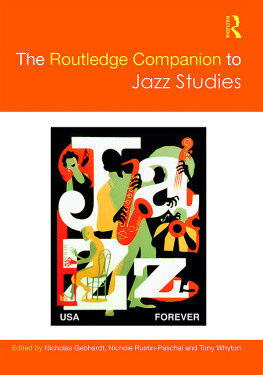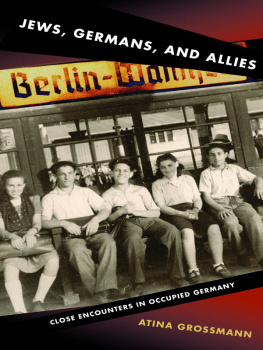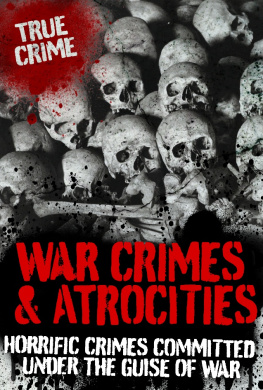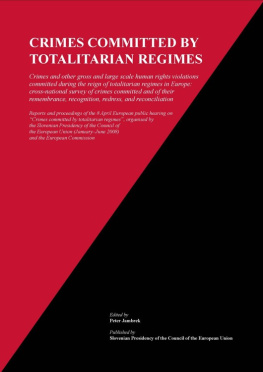Contents
Guide
Pages

Crimes Unspoken
The Rape of German Women at the End of the Second World War
Miriam Gebhardt
Translated by Nick Somers
polity
First published in German as Als die Soldaten kamen. Die Vergewaltigung deutscher Frauen am Ende des Zweiten Weltkriegs, Deutsche Verlags-Anstalt, a division of Verlagsgruppe Random House GmbH, Munich, Germany, 2015
This English edition Polity Press, 2017
Polity Press
65 Bridge Street
Cambridge CB2 1UR, UK
Polity Press
350 Main Street
Malden, MA 02148, USA
All rights reserved. Except for the quotation of short passages for the purpose of criticism and review, no part of this publication may be reproduced, stored in a retrieval system, or transmitted, in any form or by any means, electronic, mechanical, photocopying, recording or otherwise, without the prior permission of the publisher.
ISBN-13: 978-1-5095-1123-5
A catalogue record for this book is available from the British Library.
Library of Congress Cataloging-in-Publication Data
Names: Gebhardt, Miriam, author.
Title: Crimes unspoken : the rape of German women at the end of the Second World War / Miriam Gebhardt.
Other titles: Als die Soldaten kamen. English | Rape of German women at the end of the Second World War
Description: Cambridge, UK, Malden, MA : Polity Press, [2016] | Includes bibliographical references and index.
Identifiers: LCCN 2016021691 (print) | LCCN 2016022335 (ebook) | ISBN 9781509511204 (hardback) | ISBN 9781509511228 (Mobi) | ISBN 9781509511235 (Epub)
Subjects: LCSH: World War, 19391945-Women--Germany. | Rape--Germany--History--20th century. | Rape victims--Germany--History--20th century. | Soldiers--Sexual behaviour--History--20th century. | Women--Crimes against--Germany--History--20th century. | Single mothers--Germany--Social conditions--20th century. | Soviet Union--Armed Forces--Germany (East) | United States--Armed Forces--Foreign service--Germany--History--20th century. | France--Armed Forces--Germany--History--20th century. | Germany--History--19451955.
Classification: LCC D810.W7 G3913 2016 (print) | LCC D810.W7 (ebook) | DDC 940.53082/0943-dc23
LC record available at https://lccn.loc.gov/2016021691
The publisher has used its best endeavours to ensure that the URLs for external websites referred to in this book are correct and active at the time of going to press. However, the publisher has no responsibility for the websites and can make no guarantee that a site will remain live or that the content is or will remain appropriate.
Every effort has been made to trace all copyright holders, but if any have been inadvertently overlooked the publisher will be pleased to include any necessary credits in any subsequent reprint or edition.
For further information on Polity, visit our website: politybooks.com
ACKNOWLEDGEMENTS
I am grateful for the assistance provided to me while researching this book from Martina Bhmer, an expert in dealing with traumatized rape victims in geriatric care, and Jrgen Klckler, city archivist in Konstanz. My thanks go also to the staff of the archives mentioned in this book, particularly Gerhard Frmetz from the Bayerisches Hauptstaatsarchiv. The discussion and essays by students who attended my course at the University of Konstanz in the summer semester 2013 were a great inspiration.
I thank the Deutsche Verlags-Anstalt for suggesting and handling this book, particularly Thomas Rathnow and Karen Guddas, and my agent Rebekka Goepfert and social media adviser Oliver Rehbinder.
Finally, I should like to mention my husband Anthony Kauders, to whom this book is dedicated, for his personal encouragement and professional support during the burdening research work.
The author can be contacted through www.miriamgebhardt.de and www.facebook.com/gebhardt.autorin.
INTRODUCTION
A book project on the rape of German women at the end of the Second World War and during the occupation has first to confront certain prejudices. It is as if a single frame in a film has been frozen in our collective memory. It shows a Russian with Asiatic features yelling Urri, Urri, but demanding not only the watch but also the woman. We have all seen it on television: blonde woman, played by Nina Hoss, amid the rubble, with a slavering Mongol waiting in the shadows. Is there still anything important to say on this subject? The war is long over, the victims are very old or dead, and later generations find the war stories from Hollywood or Babelsberg more exciting. And then rape is that not a relic, an archaic crime that always proceeds along much the same lines whether in Germany then, or in Iraq, Syria or South Sudan today? At best the subject offers a cheap platform for the eternal moralists and nationalists with their clear ideas about good and evil. Then it was the Russians who were the wrongdoers; today it is others in any event, evil men once again.
While working on this book, I frequently asked myself why the wartime rape of German women was still of interest to me today, more than seventy years later. The simple and half-true answer is that the lens through which we look at this time is in urgent need of cleaning.
We historians neatly talk of a gap in research when we find very little reliable information about a topic. But the historians demand for full accountability is not a sufficient argument for me. There must be more important reasons for descending into such a dark valley.
One such reason could be the demand for fair treatment. The legitimacy of the recollection of the events that took place after the arrival of the Allies is still questioned. There are still voices that say that the investigation of the mass rape of German women is inevitably designed to make up for the crimes committed against victims of German aggression and hence to relativize the Holocaust.
But for me the main reason for addressing this fundamental mistrust is that a considerable number of those affected have never been recognized as victims. According to my calculations, at least 860,000 women (and a good number of men) were raped after the war. At least 190,000 of them, perhaps even more, were assaulted by US soldiers, others by British, Belgian or French. Nothing has ever been said about these victims. Just as the misdeeds of big brother were swept under the carpet in East Germany, West German society also kept silent about the attacks by its democratic liberators. The women raped by Russian soldiers were at least afforded some recognition, even if it was manipulated for ideological ends, being used to point a finger in the EastWest conflict. The women violated by GIs, British and French soldiers, by contrast, were, if anything, punished with contempt. Under the Sword of Damocles of the public condemnation of fraternizing women i.e. women who allegedly prostituted themselves to the enemy and thus stabbed their own nation in the back it was practically impossible for the victims of Western sexual aggression to have their stories told. The same applied to the women in the Soviet occupied zone and East Germany. In those cases, too, the experience of violence, if mentioned at all, was put down to their own character weakness.
There have been only two books to date that have reached a wider audience: the diary by Anonymous mentioned earlier, which was made into a film in 2008, and the first study by the feminist and film-maker Helke Sander in 1992. Both projects had the same setting Berlin and the same perpetrators members of the Red Army. However worthy these two studies were, they reinforced the belief of most Germans that the wartime sexual violence was a problem of the Soviet soldiers, whereas the other Allies had rather to be protected from lovelorn German women. Thus Sander and Anonymous, and also the journalist Erich Kuby with his series The Russians in Berlin, which appeared in the German news magazine











